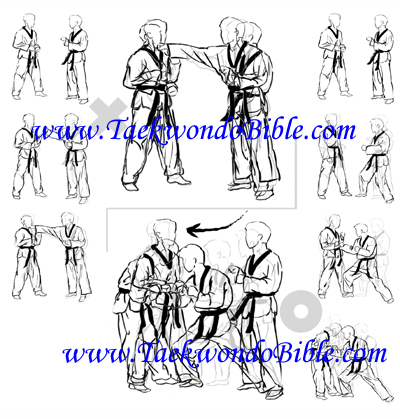
Part
III. SAMJAE
Chapter
16
Both
Attaching Victory and Defeat and Transcending Them
| |
"How should I train my mind?"
"First control your life, second see the other aspect of things,
and third put an end to your attachment."
|
|
Taekwondo's origin in life has to do with the quest for victory. Defeat
in a violent life and death struggle means death, losing one's life. Owing
to this, Taekwondo begins in the absolute obligation to win. This is also
where it ends.
This fact is natural, simple and essential. Even when transcendence over
victory or defeat is discussed, this will be worthless in Taekwondo unless
it has the power to subdue the opponent. It would be even more hopeless
to build your personality upon it. This is because you can build your
personality only through training, and this consists in the process of
self-development. This development has its goals. First, Taekwondo empowers
you enough to first subdue your opponent and then to illuminate through
training the meaning of life. In this way, Taekwondo is for victory because
it is for man's whole life. Here it will be meaningless to inquire further
why an activity that is called "Taekwondo" is for man's life.
However, defeat does not in every case imply death. Victory and defeat
mix and intermingle with each other in a great variety of life situations.
Therefore, it is required that as a Taekwondo-Een, embracing the whole
of life, you should strive for knowledge and to open yourself up to what
is not Taekwondo. You need also to nurture a transcendental and contemplative
attitude capable of wise judgment and decision-making.
The standard of judgment in Taekwondo is both simple and complicated.
You must win that battle which is necessary for survival, for the lives
of others, or for justice. On the other hand, victory or defeat for your
instant honor should be transcended as those concerned with your emergent
emotion or desire should be avoided. This kind of distinctive judgment
is the starting point of the Taekwondo-Een's activity in life, which is
due to the fact that man's life is essentially distinctive though everything
exists non-distinctively.
There are two different aspects of Taekwondo's contemplation that transcends
victory or defeat. One is transcendence for victory and the other transcendence
over victory or defeat.
Although you have the path to life or a death under your very nose, you
should not fall into utter confusion but maintain a calm, open mind. Here
there can be neither attachment to life nor fear of death. Fear can neither
grant you an ability you do not possess, nor can attachment distance you
from death. This is transcendence for victory.
On the other hand, life and the death do not stand distinctively as fundamentally
different. The living and the dead move into one other in an endless cycle
so that "to be alive" has no absolute meaning. The absoluteness
of life for you is merely a sort of illusion, a mirage caused by the fact
that you live and desire to live. Victory and defeat are also like this.
Is it not true that the most to be got from victory or defeat is life
or death? This is transcendence over victory or defeat itself.
These two aspects of transcendence in Taekwondo are different features
of a thing, so ultimately they are one and the same. This knowledge allows
us to contemplate that man's life and nature's changes are no different.
These features of Taekwondo reveal the similarities and differences between
TAEKWONDO and religion. Religion is a transcendence of life through faith
while TAEKWONDO implies transcendence to the inside of the life through
a system of actions and belief. In the final result there is nothing distinctively
different between the two. Thus, Taekwondo is not ultimately a tool for
victory but for the lives of all. However, as it is inevitably concerned
with the issue victory it always implies the "oughtness" of
not losing. Taekwondo taken as a skill consists of this "oughtness".
In this manner, Taekwondo coming from the boundary of life and death leads
to the center of the absoluteness of victory. This is the direction of
transcendence that Taekwondo implies. The boundary of life and death can
be found everywhere in life. Accordingly, the whole life of the Taekwondo-Een
lies in the absoluteness toward victory.
Then what is the ultimate meaning of winning and losing? To win is to
attain what you desire, to do what you wish, and thus to make complete
your own life. To do otherwise would be to lose. To determine where true
victory lays you must ask yourself what your heart desires. The best victory
for you as a true Taekwondo-Een is not the pride of victory over your
opponent. The best victory is the one wherein you and he can coexist.
All kinds of ethics and Taekwondo skills belong to this victory, which
is the essence that enables TAEKWONDO to extend into what is not Taekwondo.
Taekwondo always moves back towards man's life, which is its starting
point. Its characteristics are like those of life ever circulating. As
Taekwondo constantly extends around and back to the center of life, the
victory and defeat many people cling to are nothing more nor less than
the unavoidable processes involved in it.

|